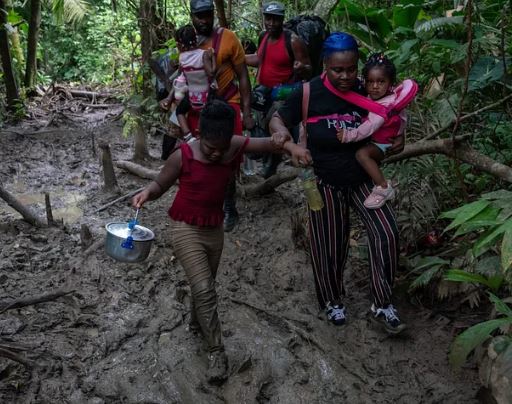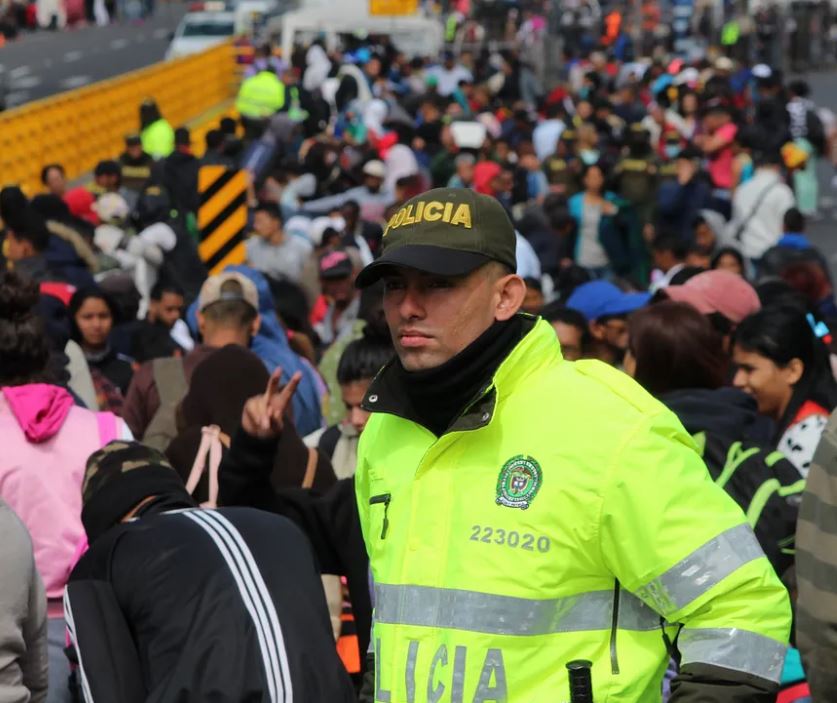As Trump-era U.S. immigration policy expires, Biden’s ‘deterrence strategy’ could be even tougher
By Joshua Collins
Title 42, the Trump-era migration policy enacted during the COVID epidemic that resulted in more than 2 million expulsions, will finally be allowed to expire by the Center For Disease Control (CDC) on May 11. Despite promising to end the program on the campaign trail, U.S. President Joe Biden greatly expanded the program instead.

Humanitarian workers give warm drinks to migrants on the Colombian-Ecuadorian border (Photo: Joshua Collins)
Ahead of an expected surge in migrants, Washington has enacted several policies across the region, and well beyond U.S borders, as a “prevention through deterrence strategy”. What that means for Colombia and its infamous Darien Gap, the dense jungle corridor on the Panamanian-Colombian border which acts as the principal gateway for migration into Central America and beyond isn’t clear, but militarization of the Darien Gap is a distinct possibility.
On April 11 the U.S., Colombia, and Panama announced a 60-day joint military operation to “end the illicit movement of people and goods through the Darién by both land and maritime corridors.” The trilateral statement drew harsh condemnation from critics. The UN reported that 250,000 people crossed the Darién Gap in 2022 and expects as many as 400,000 to make the journey this year.
So far, residents and journalists working in the region report that the initiative, which officially began on April 20, has been limited to the waterways around the Darien, rather than within the jungle corridor itself. But a briefing by White House officials on April 14 suggested that once Title 42 expires, the operation will become more aggressive.
Kaitie Tobin, senior director of Transborder at the National Security Council, who conducted the briefing, said the initiative “will really be focused on enhancing arrests, prosecutions, and other efforts to disrupt human smuggling efforts…we are working with all countries across the region to make sure that we are prepared and in a position to prevent an increase in irregular flows [of asylum seekers].”
Colombia however, despite agreeing to an initiative with the U.S military that effectively outsources U.S border enforcement to other countries in the region, has been sending mixed signals on how far they are willing to cooperate with Biden administration policy that is increasingly deporting Colombian citizens, a number which is expected to rise further when post Title 42 policies go into effect.
On Thursday, the Colombian government temporarily suspended deportation flights from the U.S. to Colombia, condemning “cruel and degrading conditions” inflicted on deportees both on the flights and in the ICE detention centers where migrants were held before being expelled.

A Haitian family crosses the Darien Gap (on the scene reporting by PWS: photo Jordan Stern)
In an April 21 meeting with Biden, Colombian President Gustavo Petro told his U.S. counterpart that “If economic and social conditions in the countries of origin do not improve, then it is useless to criminalize immigrants in the countries of destination.”
The U.S. has also announced the opening of remote asylum processing centers in Colombia and Guatemala, with the blessing of both countries. which they claim will process “thousands of claims a month”. In the same announcement, Washington said that the total number of those expelled from the U.S. after Title 42 ends could be doubled, or even tripled.
Colombia is merely one of many countries in Central and North America seemingly grappling with unclear U.S. border policy in the short term. Mexico agreed with the Biden administration this week to accept deportees from several countries under the new policy.
Mexico has accepted expulsions of migrants from Guatemala, Honduras, and El Salvador since Title 42 was created in 2020. Since January, Mexico has also accepted expulsions of migrants from Nicaragua, Cuba, Haití, and Venezuela.
Those who have been stranded in Mexico have faced dangerous conditions, as was evidenced by a fire at a migrant detention center in Ciudad Juarez in March that killed 39 people.
Under pressure from the U.S., Mexico has also created bottlenecks at their southern border, detaining, delaying, and sometimes even persecuting migrants arriving from Central America. In Honduras, a backlog of those who have crossed the Darien Gap from Colombia, then Panama and Nicaragua have left thousands waiting for the opportunity to continue north, and a budding humanitarian emergency.
Overall, despite a lot of rhetoric from the White House about “increased legal pathways”, Biden’s new migration program seems to be a crackdown on asylum claims rather than an expansion. Stephanie Brewer, Mexico director at the Washington Office on Latin America, in a recent piece for World Politics Review, wrote that “Biden Is rebranding Trump’s border policies, not dismantling them.”

A Colombian policeman on the Ecuador-Colombia border (Joshua Collins)
The new policies also come with “stiffer consequences for failing to use legal pathways”, according to the White House. In addition to up to 5-year bans on those who cross into the country informally, the new Biden policy also prohibits claims at ports of entry from people who traveled through a third country to reach the border — a rule that makes hundreds of thousands of migrants ineligible. Journalists who cover migration, as well as some experts and human rights organizations, have called the policy an “asylum ban”.
Meanwhile, Biden has announced the deployment of 1,500 troops to the Mexican border.
Todd Miller, a long-time border correspondent wrote last week in The Border Chronicle that the goal of Biden’s deterrence policy is to “push U.S. border enforcement further away, away from the cameras and the press, away from global awareness. Border enforcement becomes out of sight, out of mind.”
The Darien Gap is controlled on the Colombian side by the largest and most powerful narco paramilitary group in the country, the Gaitanista Self-Defense Forces of Colombia (AGC) — which the government calls the “Clan del Golfo”, who would likely vigorously defend against any attempt to displace them.
On the Panamanian side, by a host of mafias and armed groups both local and national. One representative who works for an NGO in the region who asked to speak anonymously to avoid pushback from both countries described a military plan to dislodge them as “patently insane.”
But despite the lack of clarity on what exactly Biden’s new migration policy will mean for migrants and transit countries, one thing is certain. It is a lack of legal pathways that has pushed hundreds of thousands into the dangerous conditions imposed by criminal armed groups, smugglers, and state security forces in the migration corridor that runs from Colombia to the U.S. border.
“Deterrence” policies are only going to make that perilous trek even deadlier.
____________________
Credit: Pirate Wire Service

















